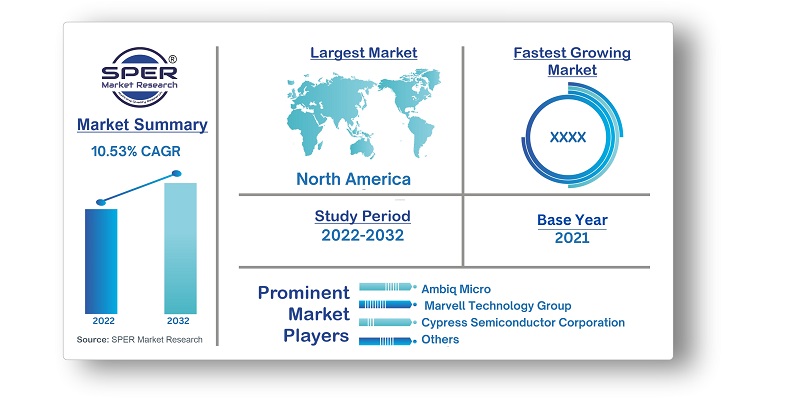
Ultra Low Power Microcontroller Market Growth, Trends, Size, Share and Future Outlook 2032
Ultra Low Power Microcontroller Market Size- By Peripheral Devices, By Packaging Type, By End Use Industry- Regional Outlook, Competitive Strategies and Segment Forecast to 2032
| Published: Mar-2023 | Report ID: SEMI2315 | Pages: 1 - 234 | Formats*: |
| Category : Semiconductor and Electronics | |||

-012071424032023.jpg)
| Report Metric | Details |
| Market size available for years | 2019-2032 |
| Base year considered | 2021 |
| Forecast period | 2022-2032 |
| Segments covered | By Peripheral Devices, By Packaging Type, By End Use Industry |
| Regions covered | Asia-Pacific, Europe, Middle East and Africa, North America, Latin America |
| Companies Covered | Ambiq Micro, Analog Devices, Inc., Cypress Semiconductor Corporation, ELAN Microelectronics, Intel Corporation., Marvell Technology Group, Maxim Integrated, Microchip Technology Inc., Nuvoton Technology Corporation, NXP Semiconductors N.V., ON Semiconductor, Panasonic Corporation, Renesas Electronics Corporation, ROHM Semiconductor |
- Value-Added Resellers (VARs)
- Logistics Companies
- Network operators
- Technology consultants
- Investors and venture capitalists
- Chief financial officers
- Logistics Software Vendors/ Developers
- Analog Devices
- Digital Devices
- 8-bit
- 16-bit
- 32-bit
- Aerospace & Defense
- Automotive
- Servers and Data Centers
- Consumer Electronics
- Telecommunications
- Healthcare
- Media and Entertainment
- Manufacturing
- Asia-Pacific
- Europe
- Middle East & Africa
- North America
- Latin America
- Size of Ultra low power microcontroller market (FY’2019-FY’2032)
- Overview of Ultra low power microcontroller market
- Segmentation of Ultra low power microcontroller market by Peripheral Devices (Analog Devices, Digital Devices)
- Segmentation of Ultra low power microcontroller market by Packaging Type (8-bit, 16-bit, 32-bit)
- Segmentation of Ultra low power microcontroller market by End Use Industry (Aerospace & Defense, Automotive, Servers and Data Centers, Consumer Electronics, Telecommunications, Healthcare, Media and Entertainment, Manufacturing, Others)
- Statistical Snap of Ultra low power microcontroller market
- Growth Analysis of Ultra low power microcontroller market
- Problems and Challenges in Ultra low power microcontroller market
- Competitive Landscape in the Ultra low power microcontroller market
- Impact of COVID-19 and Demonetization on Ultra low power microcontroller market
- Details on Recent Investment in Ultra low power microcontroller market
- Competitive Analysis of Ultra low power microcontroller market
- Major Players in the Ultra low power microcontroller market
- SWOT Analysis of Ultra low power microcontroller market
- Ultra low power microcontroller market Future Outlook and Projections (FY’2019-FY’2032)
- Recommendations from Analyst
1.1. Scope of the report1.2. Market segment analysis
2.1 Research data source2.1.1 Secondary data2.1.2 Primary data2.1.3 SPER’s internal database2.1.4 Premium insight from KOL’s2.2 Market size estimation2.2.1 Top-down and Bottom-up approach2.3 Data triangulation
4.1. Driver, Restraint, Opportunity and Challenges analysis4.1.1 Drivers4.1.2 Restraints4.1.3 Opportunities4.1.4 Challenges4.2. COVID-19 Impacts of the Ultra low power microcontroller market
5.1. SWOT analysis5.1.1 Strengths5.1.2 Weaknesses5.1.3 Opportunities5.1.4 Threats5.2. PESTEL analysis5.2.1 Political landscape5.2.2 Economic landscape5.2.3 Social landscape5.2.4 Technological landscape5.2.5 Environmental landscape5.2.6 Legal landscape5.3. PORTER’S five forces analysis5.3.1 Bargaining power of suppliers5.3.2 Bargaining power of Buyers5.3.3 Threat of Substitute5.3.4 Threat of new entrant5.3.5 Competitive rivalry5.4. Heat map analysis
6.1 Ultra low power microcontroller Manufacturing Base Distribution, Sales Area, Product Type6.2 Mergers & Acquisitions, Partnerships, Product Launch, and Collaboration in Ultra low power microcontroller market
7.1 Analog Devices7.2 Digital Devices
8.1 8-bit8.2 16-bit8.3 32-bit
9.1 Aerospace & Defense9.2 Automotive9.3 Servers and Data Centers9.4 Consumer Electronics9.5 Telecommunications9.6 Healthcare9.7 Media and Entertainment9.8 Manufacturing9.9 Others
10.1 Ultra low power microcontroller market Size and Market Share by Region (2019-2025)10.2 Ultra low power microcontroller market Size and Market Share by Region (2026-2032)10.3 Asia-Pacific10.3.1 Australia10.3.2 China10.3.3 India10.3.4 Japan10.3.5 South Korea10.3.6 Rest of Asia-Pacific10.4 Europe10.4.1 France10.4.2 Germany10.4.3 Italy10.4.4 Spain10.4.5 United Kingdom10.4.6 Rest of Europe10.5 Middle East and Africa10.5.1 Kingdom of Saudi Arabia10.5.2 United Arab Emirates10.5.3 Rest of Middle East & Africa10.6 North America10.6.1 Canada10.6.2 Mexico10.6.3 United States10.7 Latin America10.7.1 Argentina10.7.2 Brazil10.7.3 Rest of Latin America
11.1 Ambiq Micro11.1.1 Company details11.1.2 Financial outlook11.1.3 Product summary11.1.4 Recent developments11.2 Analog Devices, Inc.11.2.1 Company details11.2.2 Financial outlook11.2.3 Product summary11.2.4 Recent developments11.3 Cypress Semiconductor Corporation11.3.1 Company details11.3.2 Financial outlook11.3.3 Product summary11.3.4 Recent developments11.4 ELAN Microelectronics11.4.1 Company details11.4.2 Financial outlook11.4.3 Product summary11.4.4 Recent developments11.5 Intel Corporation.11.5.1 Company details11.5.2 Financial outlook11.5.3 Product summary11.5.4 Recent developments11.6 Marvell Technology Group11.6.1 Company details11.6.2 Financial outlook11.6.3 Product summary11.6.4 Recent developments11.7 Maxim Integrated11.7.1 Company details11.7.2 Financial outlook11.7.3 Product summary11.7.4 Recent developments11.8 Microchip Technology Inc.11.8.1 Company details11.8.2 Financial outlook11.8.3 Product summary11.8.4 Recent developments11.9 Nuvoton Technology Corporation11.9.1 Financial outlook11.9.2 Product summary11.10 NXP Semiconductors N.V.11.9.3 Recent developments11.11 ON Semiconductor11.10.1 Company details11.10.2 Financial outlook11.10.3 Product summary11.10.4 Recent developments11.12 Panasonic Corporation11.11.1 Company details11.11.2 Financial outlook11.11.3 Product summary11.11.4 Recent developments11.13 Renesas Electronics Corporation11.12.1 Company details11.12.2 Financial outlook11.12.3 Product summary11.12.4 Recent developments11.14 ROHM Semiconductor11.13.1 Company details11.13.2 Financial outlook11.13.3 Product summary11.13.4 Recent developments11.14.1 Company details11.14.2 Financial outlook11.14.3 Product summary11.14.4 Recent developments
SPER Market Research’s methodology uses great emphasis on primary research to ensure that the market intelligence insights are up to date, reliable and accurate. Primary interviews are done with players involved in each phase of a supply chain to analyze the market forecasting. The secondary research method is used to help you fully understand how the future markets and the spending patterns look likes.
The report is based on in-depth qualitative and quantitative analysis of the Product Market. The quantitative analysis involves the application of various projection and sampling techniques. The qualitative analysis involves primary interviews, surveys, and vendor briefings. The data gathered as a result of these processes are validated through experts opinion. Our research methodology entails an ideal mixture of primary and secondary initiatives.



Frequently Asked Questions About This Report
PLACE AN ORDER
Year End Discount
Sample Report
Pre-Purchase Inquiry
NEED CUSTOMIZATION?
Request CustomizationCALL OR EMAIL US
100% Secure Payment






Related Reports
Our Global Clients
Our data-driven insights have influenced the strategy of 200+ reputed companies across the globe.






















